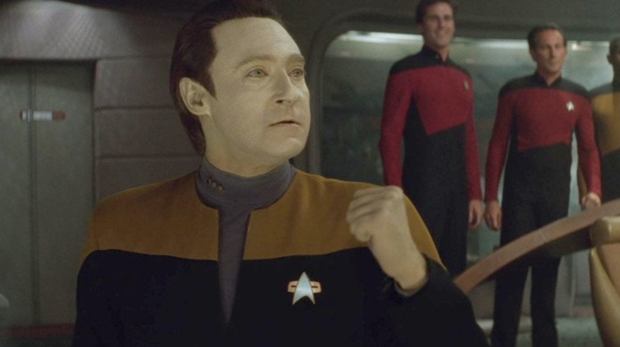The Star Trek Re-watch – Star Trek: Generations
One of the positive consequences of the COVID-19 pandemic, has been the ability for people to explore television shows and films they never got around to see. This of course comes with the caveat that one actually has time to do so. Depending on certain circumstances (i.e. children or lack thereof and the essential nature of your job) this may or may not be the case. Nevertheless, millions of people who didn’t have free time before now have the opportunity to watch every episode of The Wire or the entire Harry Potter series.
With that in mind I thought it was high time to explore some gaps in my film and television lexicon. So of course I completely scrapped that idea and decided to re-watch every one of the thirteen Star Trek films that have been released since 1979. We continue on our journey down the warp lane with the film that bridged the gap between the original crew and the next generation – Star Trek: Generations.
Star Trek: Generations (1994) Director: David Carson Written By: Ronald D. Moore and Brandon Braga Starring: Patrick Stewart, Jonathan Frakes, Brent Spiner, Michael Dorn, LeVar Burton, Gates McFadden, Marina Sirtis, William Shatner, Malcolm McDowell.
Plot: Retired Starfleet Captain James T. Kirk (Shatner) agrees to attend the christening of the newly commissioned Enterprise 1701-B. After a rescue mission goes awry on her maiden voyage, Kirk is presumed dead. Flash ahead seventy-eight years later. After Captain Jean-Luc Picard (Stewart) of the Enterprise-D receives grievous personal news, the crew must contend with a ruthless new villain named Soren (McDowell) and a mysterious energy force known as the Nexus. In the end it will take both Kirk and Picard, two of Starfleet’s most storied captains, to save the day.
After the resurgence of the Star Trek IP in the 1980s, there were two foregone conclusions. The first was that the exploits of the original crew had to end. The second was that with the conclusion of the TNG series, Picard and his crew would be the next group to have their adventures transition to the big screen. Enter Star Trek: Generations which passes the torch from one generation (upcoming pun intended) to the next. The result is an uneven if mostly entertaining film that doesn’t quite live up to expectations.
What hampers Generations from being its own entity is that the producers of said film are trying to have their Romulan ale and drink it too. The decision to include Shatner’s Kirk in the story-line both hinders and helps the film. On the one hand the opening sequence where Kirk once again rises to the occasion and saves the Enterprise is both thrilling and entertaining. However, the use of the Nexus really only serves as a deus ex machina for Kirk and Picard to meet. Don’t get me wrong, the fact that Stewart and Shatner’s characters stand toe to toe with each other and team up to save the galaxy is a pure-D bottle of Cardassian awesome sauce. It still doesn’t negate the fact that the whole setup is completely contrived.
In addition, Generations suffers from lacking a fundamentally strong villain. While the great Malcolm McDowell stands out and delivers an excellent performance, he’s essentially a delusional mad scientist driven crazy by grief. It doesn’t exactly have the impact or carry the weight of a Khan or even the Borg. You can attribute that to screenwriters Moore and Braga who although they have done excellent Star Trek work in the past, fall a little short here when it comes to Soren. I will admit that Soren’s teaming up with the Klingons in order to bring the Nexus to the precise coordinates comes off deliciously Machiavellian.
While Moore and Braga may have failed to deliver on the villain, you can’t say the same for some of the other aspects of the film. This movie is an excellent examination about legacy and what we leave behind. Despite all of Picard’s accomplishments he still feels decimated by the loss of his brother and nephew. He believes it’s too late for him to carry on the Picard name, not realizing that having children isn’t necessarily the ultimate measure of a life well-lived. Meanwhile Kirk at first shirks his own duty and legacy by expressing that he wants to remain in the Nexus, that it’s time for someone else to save the galaxy. Yet he can’t deny his very nature and ultimately decides to continue his legacy by assisting Picard and leaving the Nexus.
And speaking of the Nexus, let’s not ignore this energy vortex’s very nature. The Nexus servers in some aspects as a stand-in for narcotics. I know this might sound insane but think about it. It’s a fantasy world that promises to give you anything you want by safeguarding you from pain. Yet ultimately it is just that – a fantasy, something Kirk eventually realizes. There’s no substitute for the real world because, well, it’s the only thing that’s real. In point of fact the Nexus could be a substitute for any fantastical outlet that’s potentially harmful – excess food, video games, television, exercise, or the movies.
Another knock against Generations is the choice of director. While David Carson certainly cut his teeth on directing multiple television episodes for both TNG and DS9, directing a feature length film is an entirely different beast. Star Trek: Generations’ biggest problem stems from the fact that it feels like an extended TNG episode rather than a feature length film. Say what you will about the first six movies, none of them present themselves as anything less than cinematic. It’s why Generations falls flat in some aspects and may explain why in the twenty-six years since its release, Carson has only directed two other feature films.
I realize at this point that I may have given the impression that Star Trek: Generations is a terrible movie. That couldn’t be farther from the truth. The action in this film absolutely slays, the chemistry of the TNG crew thankfully carries over to the big screen, and how can you not love Kirk and Picard teaming up to kick some ass? Furthermore, there’s some excellent character development throughout. Data finally discovers what it means to deal with real human emotions. Meanwhile the staunch, stalwart, and collected Picard shows another side of his humanity when dealing with the death of his brother and nephew. I remember seeing the scene in the theater where he breaks down in front of Troi (Sirtis) and tearing up myself.
Star Trek: Generations is the very definition of a mixed bag. While there’s several Reese’s peanut butter cups, there’s also a fair amount of Charlie Brown sized rocks as well. Thankfully the candy outweighs the granite, resulting in an uneven but satisfying entry into the Star Trek lexicon.
My rating System:
0-1 God Awful Blind Yourself With Acid Bad
2 Straight Garbage
3 Bad
4 Sub Par
5 Average
6 Ok
7 Good
8 Very Good
9 Great
10 A Must See
Star Trek: Generations rates: 7/10
Next Up: Star Trek: First Contact!!!





I also rewatched this during the quarantine!
For me, it worked perfectly well except for the last 15 minutes. I bought the Nexus gimmick, so I had no problems with the plot until that point. But then if the characters have a sort of reset button and they can go anywhere anytime… well, it doesn’t work. :–/
By the way, I loved your analogy of the Nexus as drug addiction!
LikeLike
Thanks man! Glad you enjoyed the article!
LikeLiked by 1 person